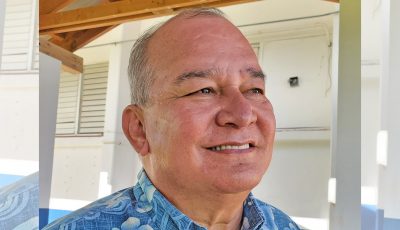Murkowski’s aid sought on HR 559
Citing the bill’s extreme urgency, Gov. Ralph DLG Torres has asked U.S. Sen. Lisa Murkowski (R-AK) to help shepherd a CNMI-specific bill through the U.S. Senate.
“I write to request your assistance and support of the recently passed bill, the Northern Mariana Islands Long-Term Legal Residents Relief Act (H.R. 559), which was received in the U.S. Senate on June 4, 2019,” said Torres in his letter to Murkowski yesterday.
“Since the December 2018 decision of the U.S. Department of Homeland Security to terminate the parole status of a number of long-term foreign residents present in the CNMI, these 1,038 individuals in the terminated categories have been in a state of uncertainty over their ability to continue their lives in these islands.”
He added that H.R. 559 will not only be a legal remedy for the 1,038 individuals and their families, but also for the Commonwealth.
H.R. 559 would grant them CNMI-only resident status.
Torres told Murkowski that he has been in communication with the U.S. Department of Homeland Security on this issue and it was the department’s recommendation to have the U.S. Congress pass legislation to fix this issue and provide greater legal status for these individuals to remain in the CNMI.
“I ask for your support in passage of this legislation and humbly request your understanding for the urgency of its enactment,” said Torres.
The Northern Mariana Islands Long-Term Residents Relief Act, or H.R. 559, which was introduced by Delegate Gregorio Kilili C. Sablan (Ind-MP), seeks to grant immigration status to certain aliens who have lived in the CNMI legally since Nov. 28, 2009.
A total of 1,038 individuals under the categorical parole or employment authorization document holders would benefit once H.R. 559 is signed into law.
U.S. Citizenship and Immigration Services terminated the program in late December last year. Those under program have a 180-day transition window to get another immigration status to remain in the CNMI legally. That transition window closes at the end of this month.
The original number was 1,039 but, according to Sablan, one of the individuals under the program has already managed to obtain a different immigration status.
H.R. 559 passed the U.S. House of Representatives last week and now awaits action in the Senate. Time, however, is not on the CNMI’s side as the 180-day window under the transitional parole status officially ends on June 29.
This will affect immediate relatives of U.S. citizens and other stateless individuals, CNMI permanent residents and their IRs, IRs of citizens of Freely Associated States (the Federated States of Micronesia, the Republic of the Marshall Islands, and the Republic of Palau), caregivers of CNMI residents.




























